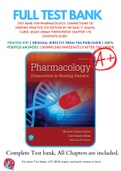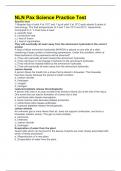PRINTED PDF | ORIGINAL DIRECTLY FROM THE PUBLISHER | 100%
VERIFIED ANSWERS | DOWNLOAD IMMEDIATELY AFTER THE ORDER
For more Test banks, ATI, HESI exams, and more contact us here:
FULL TEST BANK
T e s t B a n k F o r P h a r m a c o l o g y : C o n n e c t i o n s t o N u r s i n g P r a c t i c e 4 t h E d i t i o n B y M i c h a e l P . A d a m s ; C a r o l Q u a m U r b a n 9 7 8 0 1 3 5 9 4 9 2 2 1 C h a p t e r 1 - 7 5 C o m p l e t e G u i d e .
Complete Test bank, All Chapters are included. 1 Copyright © 2019 Pearson Education, Inc. Pharmacology: Connections to Nursing Practice, 4e (Adams) Chapter 1 Introduction to Pharmacology: Concepts and Connections 1) The nurse is teaching a pharmacology class to a group of s tudent nurses. Which key events does the nurse include in the history of pharmacology? Note: Credit will be given only if all correct choices and no incorrect choices are selected. Select all that apply. 1. Early researchers used themselves and animals as test subjects. 2. Pharmacologists began to synthesize drugs in the labora tory in the 20th century. 3. Modern pharmacology began in the mid-1600s. 4. The first drugs included morphine, cocaine, and penicillin. 5. The Dark Ages provided much useful information that we st ill use today. Answer: 1, 2 Explanation: Early researchers did use themselves and a nimals as test subjects. Pharmacologists did begin to synthesize drugs in the labor atory in the 20th century. Page Ref: 3 Cognitive Level: Applying Client Need/Sub: Physiological Integrity: Pharmacological and Parenteral Therapies Standards: QSEN Competencies: III.A.1 Demonstrate knowledge of basic scientific methods and processes | AACN Essential Competencies: IX.3 Implement holistic, patient-centered care that reflects an understanding of human growth and develop ment, pathophysiology, pharmacology, medical management and nursing management ac ross the health-illness continuum, across lifespan, and in all healthcare settin gs | NLN Competencies: Relationship Centered Care: Learn cooperatively, facilitate the learning of others | Nursing/Integrated Concepts: Nursing Process: Implementation Learning Outcome: 1-1 Identify key events in the history of pharmacology. MNL LO: 1.1.1 Apply basic concepts related to pharmacology. www.nursylab.com
www.nursylab.com 2 Copyright © 2019 Pearson Education, Inc. 2) Although all areas of medicine, including pharmacology, h ave made great advances in the past century, the early roots of pharmacology still apply for t he nurse and other health professionals. What were the early roots of pharmacology? 1. Applying products to relieve human suffering 2. Creating new drugs as quickly as possible 3. Finding medicinal alternatives to plants 4. Understanding how drugs cause their effects Answer: 1 Explanation: The early root of pharmacology was to reliev e human suffering. Page Ref: 3 Cognitive Level: Remembering Client Need/Sub: Physiological Integrity: Pharmacological and Parenteral Therapies Standards: QSEN Competencies: III.A.1 Demonstrate knowledge of basic scientific methods and processes | AACN Essential Competencies: IX.3 Implement holistic, patient-centered care that reflects an understanding of human growth and develop ment, pathophysiology, pharmacology, medical management and nursing management ac ross the health-illness continuum, across lifespan, and in all healthcare settin gs | NLN Competencies: Relationship Centered Care: Learn cooperatively, facilitate the learning of others | Nursing/Integrated Concepts: Nursing Process: Implementation Learning Outcome: 1-1 Identify key events in the history of pharmacology. MNL LO: 1.1.1 Apply basic concepts related to pharmacology. 3) Although many substances can be considered drugs, which drug def inition is the most appropriate? 1. Any substance that is found in nature or that normally o ccurs in the body 2. Any substance that is synthesized and tested in the laboratory setting 3. Any substance that is taken to prevent, cure, or reduce s ymptoms of a medical condition 4. Any substance that can be isolated from substances f ound in nature Answer: 3 Explanation: A drug is considered to be any substance that i s taken to prevent, cure, or reduce symptoms of a medical condition. Page Ref: 4 Cognitive Level: Understanding Client Need/Sub: Physiological Integrity: Pharmacological and Parenteral Therapies Standards: QSEN Competencies: III.A.1 Demonstrate knowledge of basic scientific methods and processes | AACN Essential Competencies: IX.3 Implement holistic, patient-centered care that reflects an understanding of human growth and develop ment, pathophysiology, pharmacology, medical management and nursing management ac ross the health-illness continuum, across lifespan, and in all healthcare settin gs | NLN Competencies: Knowledge and Science: Relationships between knowledge/science and quality an d safe patient care | Nursing/Integrated Concepts: Nursing Process: Implementation Learning Outcome: 1-2 Compare and contrast the terms drug, pha rmacology, and pharmacotherapy. MNL LO: 1.1.1 Apply basic concepts related to pharmacology. www.nursylab.com
www.nursylab.com 3 Copyright © 2019 Pearson Education, Inc. 4) Pharmacotherapy is a critical intervention for ma ny conditions, and a key part of nursing intervention. Which statement best describes pharmaco therapy? 1. The study of medicine and drug therapy 2. The application of natural substances to cure diseases 3. The application of drugs for the prevention and treatmen t of disease and human suffering 4. Understanding the difference between trade and generic me dications Answer: 3 Explanation: Pharmacotherapy is the application of dr ugs for the prevention and treatment of diseases and human suffering. Page Ref: 4 Cognitive Level: Understanding Client Need/Sub: Physiological Integrity: Pharmacological and Parenteral Therapies Standards: QSEN Competencies: III.A.1 Demonstrate knowledge of basic scientific methods and processes | AACN Essential Competencies: IX.3 Implement holistic, patient-centered care that reflects an understanding of human growth and develop ment, pathophysiology, pharmacology, medical management and nursing management ac ross the health-illness continuum, across lifespan, and in all healthcare settin gs | NLN Competencies: Knowledge and Science: Relationships between knowledge/science and quality an d safe patient care | Nursing/Integrated Concepts: Nursing Process: Implementation Learning Outcome: 1-2 Compare and contrast the terms drug, phar macology, and pharmacotherapy. MNL LO: 1.1.1 Apply basic concepts related to pharmacology. 5) Which principle best describes what the nurse is expecte d to understand when administering medication to a client? 1. The pharmacotherapeutics for all of the medications 2. The most common side effects of the drug's prototype 3. The trade and generic names for all of the medicatio ns 4. The cost of the drug therapy from different drug manufa cturers Answer: 1 Explanation: The nurse should understand the pharmacother apeutics for all medications that the client is receiving. Page Ref: 4 Cognitive Level: Applying Client Need/Sub: Physiological Integrity: Pharmacological and Parenteral Therapies Standards: QSEN Competencies: III.A.1 Demonstrate knowledge of basic scientific methods and processes | AACN Essential Competencies: IX.3 Implement holistic, patient-centered care that reflects an understanding of human growth and develop ment, pathophysiology, pharmacology, medical management and nursing management ac ross the health-illness continuum, across lifespan, and in all healthcare settin gs | NLN Competencies: Knowledge and Science: Relationships between knowledge/science and quality an d safe patient care | Nursing/Integrated Concepts: Nursing Process: Implementation Learning Outcome: 1-3 Explain the importance of pharmacother apy to clinical nursing practice. MNL LO: 1.1.1 Apply basic concepts related to pharmacology. www.nursylab.com
www.nursylab.com





